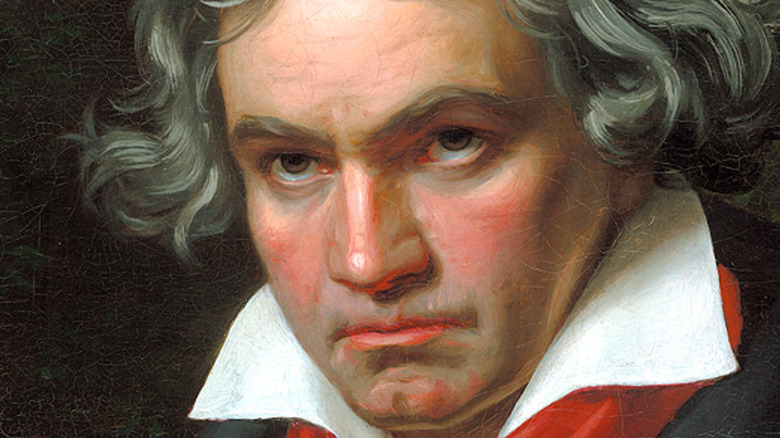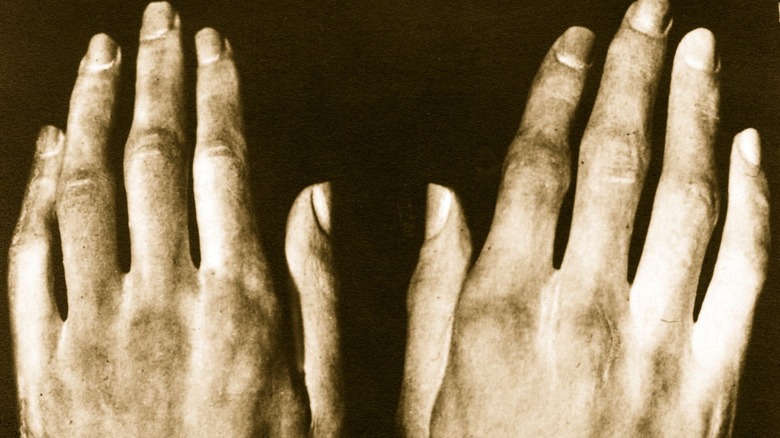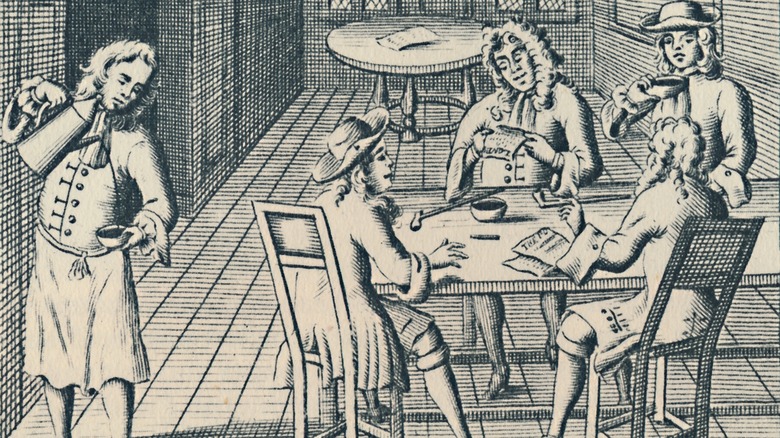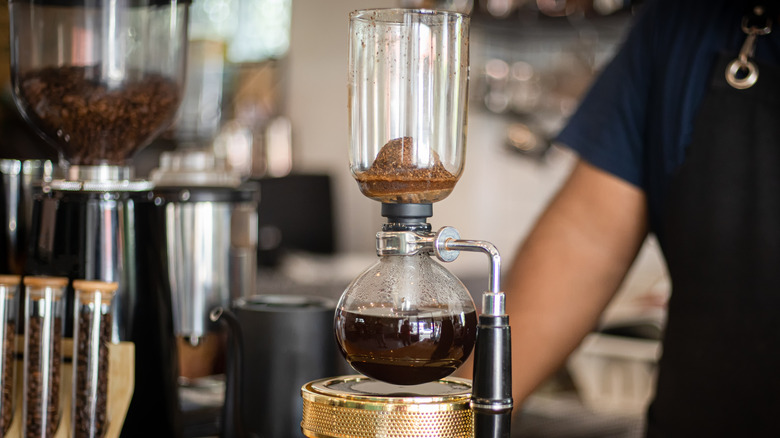Beethoven Had An Incredibly Precise Process For His Morning Coffee
If you think you do your best work after a cup of coffee, then you are in good company. Apparently, famed composer Ludwig van Beethoven wouldn't start his day without it. "Coffee seems to have been the one indispensable item in his diet," his biographer Anton Schindler wrote in "Beethoven As I Knew Him." Classical composers — they're just like us!
Where Beethoven differed from your run-of-the-mill caffeine addict is in the very particular way he brewed his coffee, at least according to Schindler's recollections. Typically, he used a glass coffee maker, which isn't so unusual. What is unusual is the fact that he would brew his coffee from exactly 60 beans. Sometimes he would eyeball the amount, but sometimes he would actually count the beans by hand. And this wasn't just something he did for himself. He was extra careful to get the number right when he had visitors over.
Beethoven did sometimes go out to coffee houses close to his home, according to Schindler. He had a defined routine for going out, too: He would enter through the back, sit in a private room, and stay only until he finished his newspaper. His haunts were so regular that people who wanted to meet the great composer would introduce themselves to him there, but he rarely talked to his new acquaintances. Schindler doesn't say if he actually ordered coffee while out or if he made the poor barista count out the 60 beans.
Life with Beethoven
How did Anton Schindler learn such precise details about Ludwig van Beethoven's routine? Schindler was a violinist who became close with the composer around 1822, according to Classic FM. At the time, Beethoven was completely deaf, so Schindler would help him out by essentially acting as a combination friend and personal assistant. This gave him an up-close-and-personal look at Beethoven's daily life, and Schindler used it to write the first biography of the famous composer.
In addition to recording Beethoven's coffee habits for posterity, Schindler also noted that macaroni and cheese was one of his favorite foods and that he liked the taste of fortified wines that weren't good for his stomach. Schindler further described the composer's rather unusual bathing habits. Beethoven would fill large containers with water and dump them over his hands, all while humming or singing scales. "Then he would stride around his room with rolling or staring eyes," Schindler continued, "jot something down, then resume his pouring of water and loud singing." This sometimes led to arguments with his landlord when the water would drip through the floorboards. While Schindler's account is colorful, it does have to be taken with a grain of salt, according to Classic FM. Not everything he wrote is true, and later music experts worked to separate the wheat from the chaff.
Classical coffee
Ludwig van Beethoven wasn't the only famous composer to drink coffee. In 1732, Johann Sebastian Bach wrote "The Coffee Cantata," according to HuffPost, a short opera that made fun of people who were panicking about the spread of coffee houses in Vienna. Wolfgang Amadeus Mozart wrote a letter to his wife detailing how he finished a concerto after drinking a cup of black coffee and smoking a pipe (via "Music in the Age of Coffee").
All three composers were participating in Europe's emerging coffee culture, as John A. Rice wrote in "Music in the Age of Coffee." Coffee was first introduced to the continent in the 17th century, with perhaps its first coffee house opening in London in 1652. The coffee drinking habit soon spread, and Europeans were quick to sing the praises of their new vice. "COFFEE arrives, that grave and wholesome liquor, That heals the stomach, makes the genius quicker," one anonymous poet wrote in 1674. Rice thinks the spread of coffee could be one reason that 18th (and, later, 19th) century composers were so productive.
Beethoven's blend
So is Ludwig van Beethoven's coffee recipe actually any good? Some enterprising baristas at the U.K.'s Green Farm Coffee Co. did the work of finding out. The brewers interpreted Beethoven's glass coffee maker as a French Balloon Coffee Maker, today referred to as a Siphon or Vacuum Coffee Maker. This kind of coffee maker has two chambers. You fill the bottom chamber with water and set it on the stove. The heat pushes the water into the top chamber, after which you add the coffee grounds. Then you take it off the heat, and the coffee returns to the bottom chamber.
Green Farm Coffee Co. said that 60 beans was not very many for contemporary tastes, but the coffee still came out well. "We've got to give it to Beethoven, it's not the worst recipe for coffee in the world," the company wrote. For good measure, they also tried the 60-bean recipe with an espresso maker and a cafetiere. They found that the espresso was decent, but the cafetiere brew was too weak. "[W]e hope Beethoven had better tastes than this," they wrote.



